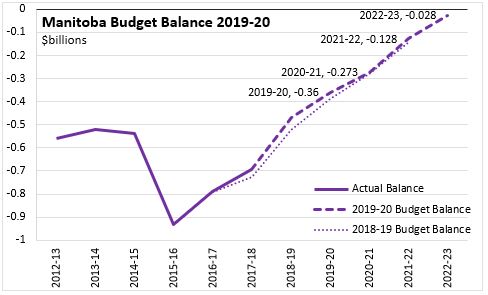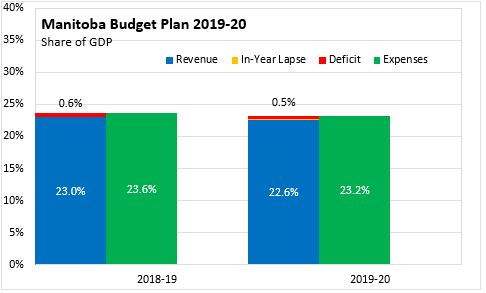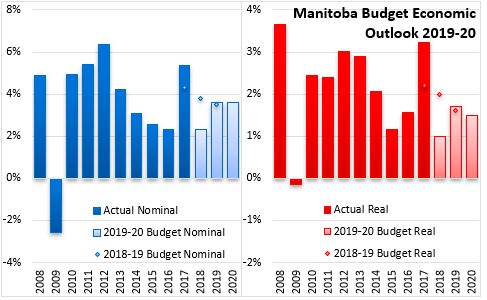The Economics and Statistics Division maintains archives of previous publications for accountability purposes, but makes no updates to keep these documents current with the latest data revisions from Statistics Canada. As a result, information in older documents may not be accurate. Please exercise caution when referring to older documents. For the latest information and historical data, please contact the individual listed to the right.
<--- Return to Archive
For additional information relating to this article, please contact:
March 08, 2019MANITOBA BUDGET 2019-20 Manitoba's 2019-20 Budget plans for a deficit of $360 million (summary basis), following a deficit forecast of $470 million for the 2018-19 fiscal year.
Manitoba's Budget also includes a $95 million in-year adjustment/lapse which reflects planned expenditures that are not ultimately made during the fiscal year. It also includes provision to transfer $50 million to the Fiscal Stabilization Fund.

The Manitoba Budget did not include a fiscal plan for revenues and expenditures beyond 2019-20. However, the Budget indicated that deficits would decline, but not be eliminated, over the next three fiscal years. Deficits are projected at $273 million in 2020-21, $128 million in 2021-22 and $28 million in 2022-23. This path of deficit reduction is similar to the fiscal plan from the 2018-19 Manitoba Budget.


The size of Manitoba's provincial government is expected to decline slightly with revenues as a share of GDP falling to 22.6 per cent in 2019-20 and expenditures falling to 23.2 per cent. Manitoba's deficit in the next fiscal year is expected to be 0.5 per cent of GDP.

Manitoba's economy (real GDP) accelerated to 3.2 per cent growth in 2017 on rising expenditures for major projects in agri-food, mining, manufacturing, communications and retail. Completion of some of these projects is estimated to have slowed real GDP growth to 1.0 per cent in 2018. In the near term, the Manitoba Budget assumes that the provincial economy will rebound with real GDP growth of 1.7 per cent in 2019 and 1.5 per cent in 2020. Manitoba's economic stabilization is predicated on steadier investment expenditures, employment/wage growth and the impacts of a cut in the Provincial Sales Tax. Previous investments are also expanding productive capacity in Manitoba and sustaining the province's growth rate in the near term.

Key Measures and Initiatives
The Manitoba Budget focused its new initiatives in tax measures:
- Manitoba's provincial sales tax rate will be reduced from 8 per cent to 7 per cent effective July 1, 2019
- The film and video production tax credit will be made permanent with a doubling of planned expenditures to $31.5 million
- Provincial sales tax will not be levied on carbon taxes
- The basic personal amount and other personal income tax bracket thresholds will be increased by 2.6 per cent for the 2019 taxation year
Manitoba Budget 2019-20
<--- Return to Archive